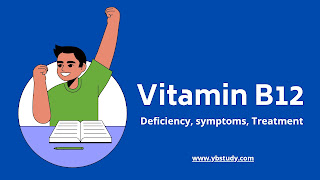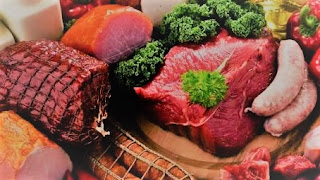Vitamin B12 – Sources, Deficiency, Benefits, Diagnosis and Treatment
Our body needs various types of vitamins, minerals, proteins, fiber, and carbs to keep it healthy. Most nutrients are usually obtained from different food sources. Vitamin B12 is a vitamin that is very useful for the body but is not synthesized in the human body.
Vitamin B12 is also known as Cobalamin. The lack of vitamin B12 leads to many problems. Here we discuss What is vitamin B12, why vitamin B12 is important for the body, what are the symptoms of vitamin B12 deficiency and what are benefits of vitamin B12.
Vitamin B12 plays a special role in the formation of red blood cells in the body and in making the nervous system healthy. It is considered very beneficial for mental health.
Vitamin B12 protects against brain damage and diseases like Alzheimer’s. In addition to this, it reduces stress, so this vitamin is also known as an anti-stress vitamin.
Vitamin B12 Definition
- Vitamin B12 is a water-soluble vitamin that is naturally produced by microorganisms but is not synthesized in the human body.
What is Vitamin B12?
- Vitamin B12 is a water-soluble vitamin that belongs to the B complex of vitamins.
- It contains cobalt and a cyano group and therefore vitamin B12 is also known as cobalamin or cyanocobalamin.
- It is also called a red vitamin because it consists of cobalt.
- There are four common derivatives of vitamin B12, namely cyanocobalamin, methylcobalamin, adenosylcobalamin, and hydroxocobalamin.
- Cobalamin is the only vitamin that contains metal elements.
- Cyanocobalamin is involved in the metabolism of proteins, fats, and carbohydrates.
- Vitamin B12 is not synthesized in the human body.
- Its intake occurs with food – sources of vitamin B12. Contain cobalamin products of animal origin: liver, beef, fish, eggs, milk, and cheese.
- Vitamin B 12 can only be synthesized by bacteria and archaea (single-celled microorganisms), which have unique enzymes necessary for its synthesis.
- Most of all cyanocobalamin (B12) vitamins are stored in the liver. A large amount of it is absorbed by the spleen and kidneys, somewhat less by the muscles.
- Vitamin B12 has two active coenzymes, methylcobalamin, and deoxyadenosylcobalamin. They carry methyl one-carbon groups (the process of transmethylation).
- Vitamin B12 is a cofactor for the enzyme homocysteine methyltransferase, which is involved in the conversion of homocysteine to methionine.
- Methionine is important for the synthesis of phospholipids and the myelin sheath of neurons.
- B12 is also involved in the synthesis of methionine, acetate, and deoxyribonucleotides (metabolism of proteins and nucleic acids).
- Cyanocobalamin is a coenzyme that transports folic acid into cells. Methylcobalamin is involved in the synthesis of the active form of folic acid, through which the formation of pyrimidine and purine bases, nucleic acids.
- The main physiological function of vitamin B12 is to participate in the production of bone marrow red blood cells to prevent pernicious anemia; to prevent damage to the brain nerves.
Structure of Vitamin B12 (Cobalamin)
Is vitamin B12 harmful to the body?
Benifits of Vitamin B12
- Vitamin B12 production promotes the development and maturation of red blood cells and prevents pernicious anemia.
- Vitamin B12 also helps to produce energy by converting carbohydrates into glucose.
- It plays an important role in the development and functions of brain and nerve cells.
- Cobalamin helps in the production of the body’s genetic materials DNA and RNA.
- It helps in the metabolism of carbohydrates, fats, and proteins.
- It can promote the synthesis of protein, which plays an important role in the growth and development of infants and young children.
- It is an indispensable vitamin for the function of the nervous system and participates in the formation of lipoprotein in the nervous tissue.
- Vitamin B12 can improve brain metabolism, enhance memory,
- It takes part in the synthesis of neurotransmitters and maintains the metabolism and function of nerve myelin.
- Vitamin B12 is used to treat Alzheimer’s disease and peripheral neuropathy.
- Vitamin B12 can also participate in the metabolism of homocysteine and reduce the level of homocysteine in the blood, so it can be used for hyperhomocysteinemia.
Sources of Vitamin B12
- Egg: Eggs are the finest source of vitamin B12 and proteins. Eating two eggs meets about 46% of the daily requirement of your body. Higher levels of vitamin B12 are present in egg yolk than in egg whites. Eggs contain vitamins and minerals that are necessary for the heart, brain, and nervous system to function properly.
- Soybean: Vitamin B12 is abundant in soybeans. You can also use soya milk or soybean oil as a source of vitamin B12.
- Oats: Oats not only reduce weight but also provide plenty of fiber and vitamins. Oats are a good source of Vitamin B12.
- Milk: Most of the nutrients are found in milk. By consuming milk we can overcome vitamin B12 deficiency. Milk is a great source of Vitamin B12 which is found in good quantity. Milk and other dairy products are a good source of many essential nutrients, including calcium, protein, many vitamins, and minerals.
- Yogurt: It is an abundant source of vitamins B1, B2, and B12. By consuming yogurt we can overcome vitamin B12 deficiency. Similar to milk, yogurt also provides many nutrients such as vitamin B12, calcium, and protein, it is also a source of probiotics.
- Cheese: Cheese is also a good source of vitamin B12, protein, and calcium. You can consume cottage cheese to get a proper amount of vitamin B12. About 28% of the daily requirement for vitamin B12 is found in 22 grams of cheese.
- Fish: There are many options for vitamin B12 for people who eat non-veg. The lobster, tuna, salmon, and other seafood you eat get vitamin B12. Salmon and tuna is a great source of nutrients, including protein, vitamins, and minerals. A 100-gram serving of cooked tuna contains 453% of the daily requirement for vitamin B12.
- Chicken: Chicken is filled with high-quality proteins and vitamins. Chicken contains a good amount of vitamin B12. Apart from this, vitamin B9 is also found. With chicken, you can meet the daily need for vitamin B12 for a healthy life.
- Meat: Meat is an excellent source of Vitamin B12, high-quality protein, folic acid, iron, and essential amino acids. About 190 grams of meat provides 467% of the daily requirement of vitamin B12. Vitamins B2, B3, and B6 are also found in meat.
- Mushroom: Mushrooms are considered a good source of vitamin B12, protein, minerals, antioxidants calcium, and iron. Mushrooms reduce the risk of diseases such as Alzheimer’s, cancer, diabetes, and heart disease.
What is vitamin B12 deficiency?
Causes of vitamin B12 Deficiency
- Insufficient intake of vitamin B12: Insufficiency of congenital reserve: Pregnant women are often deficient in vitamin B12 due to a long-term vegetarian diet, pernicious anemia, and gastrointestinal surgery, which leads to a decrease in the congenital reserve of newborns.
- Unreasonable dietary structure: Long-term vegetarian or phenylketonuria patients who refuse to consume animal protein for a long time can cause vitamin B12 deficiency in the body.
- Pernicious anemia: Pernicious anemia is the most common cause of vitamin B12 deficiency.
- Abnormal Absorption: Abnormal or absent intrinsic factor, slow release of vitamin B12, reduced absorption of vitamin B12 in the body. In abnormal absorption, our body is unable to absorb nutrients from their diets, such as carbohydrates, proteins, fats, minerals or vitamins, etc.
- Inborn errors of vitamin B12 transport and metabolism: A series of inborn errors of cobalamin synthesis can lead to cobalamin deficiency. Even vitamin B12 transport and metabolism can also cause vitamin B12 deficiency.
- Other factors: The anesthetic nitrous oxide can cause the loss of biological activity of vitamin B12 and cause spinal cord degeneration; large doses of vitamin C can lead to decreased utilization of vitamin B12 in food; inappropriate folic acid supplementation can induce or exacerbate vitamin B12 deficiency.
Common symptoms of vitamin B12 deficiency
- Fatigue: Fatigue is a feeling of constant tiredness or weakness. Anemia caused by vitamin B-12 deficiency results in insufficient red blood cells that carry oxygen into various tissues and organs of the body, making it easy to feeling of constant tiredness or weakness. Fatigue makes it hard to do your usual daily activities.
- Shortness of breath: Some people with anemia have shortness of breath is a common symptom of vitamin B12 deficiency.
- Mood ups and downs: Vitamin B12 can also participate in the metabolism of homocysteine and reduce the level of homocysteine in the blood. Vitamin B12 will help break down a brain chemical called homocysteine. When homocysteine is excessively accumulated in the brain, it may make people feel irritable or affect their mental health.
- Loss of appetite: People who are deficient in vitamin B12 may experience loss of appetite due to digestive issues, and chronic loss of appetite can lead to weight loss.
- Loss of Memory: Insufficient concentration of vitamin B12 in the body can cause cognitive impairments such as difficulty in thinking, and reasoning, or loss of fragmented memory, which is caused by the reduction of the oxygen-carrying capacity of the brain. Therefore, some scholars have conducted further research and found that insufficient vitamin B12 concentration will increase the risk of dementia and Parkinson’s disease.
- Rapid heartbeat: When anemia occurs, to maintain enough oxygen to enter tissues and organs, the body will increase the blood flow rate of the body and the circulation rate of the whole blood, which will force the heartbeat to become faster.
- Problems in the oral cavity: Lack of vitamin B12 will reduce the number of red blood cells, make insufficient oxygen carry into the tongue, and reduce the metabolic rate of waste, which can easily cause oral problems. Examples include a bitter taste in the mouth, mouth sores, inflammation, swelling, or burning in the mouth.
Testing of Vitamin B12 Deficiency
Diagnosis of Cobalamin (Vitamin B12) Deficiency
Vitamin B12 Deficiency Prevention
Frequently Asked Questions on Vitamin B12
- Peripheral nerve degeneration, spinal cord subacute combined degeneration.
- Cardiovascular and cerebrovascular diseases: Hyperhomocysteinemia is caused by vitamin B12 deficiency, and this disease is a risk factor for atherosclerosis and venous thromboembolism, so it can be secondary to cardiovascular and cerebrovascular diseases.
- If the anemia is severe, anemia heart disease, and heart failure may be secondary.
- People who do not eat animal food for a long time.
- Elders.
- Patients with gastrointestinal-related diseases, mainly including chronic atrophic gastritis, gastric cancer, Helicobacter pylori infection, intestinal disease after antibiotic treatment, gastric surgery, gastrointestinal reconstruction for obesity, Sjogren’s syndrome Sign, etc.
- Alcoholics.
- Insufficient intake: long-term vegetarian diet, causing vitamin B12 deficiency in the body.
- Abnormal absorption is caused by gastrointestinal diseases: such as chronic atrophic gastritis, gastric cancer, and Helicobacter pylori infection.
- Alcoholism.
- Genetic factors.



